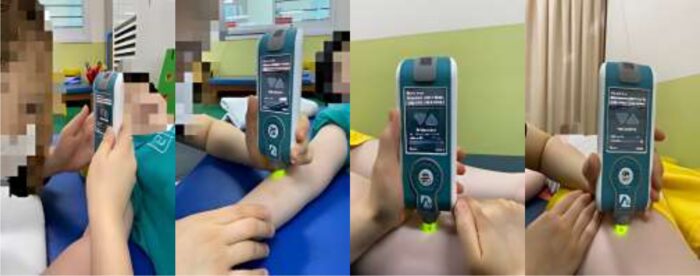Publications

Intra-Rater and Inter-Rater Reliability Analysis of Muscle-Tone Evaluation Using a Myotonometer for Children with Developmental Disabilities
Authors: Heeae Seo 1, Jeongseon Kim 2, Changseon Yu 3, Hyoungwon Lim 4
Affiliations:
- Department of Physical Therapy, Graduate School, Dankook University, Cheonan 31116, Republic of Korea
- Department of Physical Therapy, Gangdong University, Eumseong-gun 27600, Republic of Korea
- Department of Rehabilitation Medicine, Dongguk University Ilsan Hospital, Goyang 10326, Republic of Korea
- Dankook University Disabled Rehabilitation Research Institute, Department of Physical Therapy, Dankook University, Cheonan 31116, Republic of Korea
Journal: Healthcare - March 2023, Volume 11, Issue 6, Article no. 782 (DOI: 10.3390/healthcare11060782)
-
Field & Applications:
- Medical
- Pediatrics
- Musculoskeletal disorder
- Reliability
- The results of this study showed excellent reliability, suggesting that myotonometry can be used to measure muscle tone in children with developmental disabilities.
Assessing muscle tone is an essential component of the diagnosis, prognosis, and treatment planning of developmental disabilities (DD) in children and is of great help in developing clinical diagnosis patterns. The purpose of this study was to investigate intra-rater and inter-rater reliability using the myotonometer, which is an assessment tool to measure muscle tone in children with DD.
This study included 26 children diagnosed with DD. Two physical therapists measured the children’s muscle tone using a myotonometer. For all the muscles measured, reliability was determined using the intra-class correlation coefficient (ICC), the standard measurement error (SEM), and the minimal detectable change (MDC).
The intra-rater reliability for all muscles was excellent (ICC = 0.75~0.78), except for the biceps brachii (ICC = 0.68). The inter-rater reliability was also excellent for all muscles (ICC = 0.75~0.95), and the SEM and MDC showed small measurement errors. Therefore, the intra-rater and inter-rater reliability of measurements by the myotonometer was found to be good or excellent.
This suggests that the myotonometer is a tool that can objectively assess muscle tone, and it can be utilized in clinical practice to quickly and conveniently measure muscle tone in children with DD.

Figure 2. Muscle-tone measurements for each muscle were acquired using the MyotonPRO. Measurements of muscle tone.
Keywords: myotonometer, reliability, developmental disabilities, muscle tone
This study conducted a reliability analysis of the measurement of muscle tone using a myotonometer for children with developmental disabilities. The intra- and inter-rater reliabilities were good or excellent, as measured using a myotonometer in four muscles (biceps brachii, brachioradialis, rectus femoris, and tibialis anterior) in children with developmental disabilities. The results also showed low values in SEM and MDC. Therefore, the myotonometer is a tool that can objectively evaluate muscle tone and can be used to quickly and conveniently measure the muscle tone of children with developmental disabilities in clinical practice.


